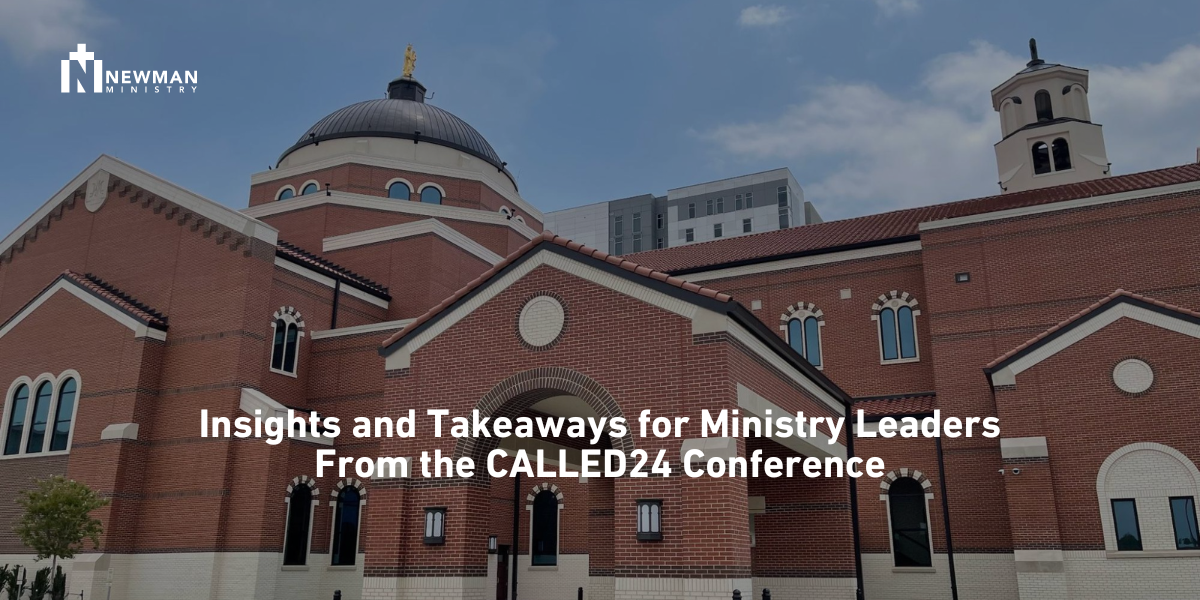
 St. Mary’s Catholic Center, Texas A&M University, College Station, TX
St. Mary’s Catholic Center, Texas A&M University, College Station, TX
We are still inspired by our experience at the CALLED24 conference hosted by CCMA! This year, the event was held at St. Mary’s Catholic Center at Texas A&M University in College Station, TX. It was an inspiring gathering of Catholic leaders, educators, and ministry professionals, all dedicated to the vital mission of nurturing the faith of young people.
This year’s theme was to “ARISE” as we opened our hearts to the transformative power of Christ and His Love within the campus ministry community. It was an incredible three days with a stacked program of engaging speakers and workshops. Here are some of our key takeaways from this experience:
1. Called to Serve all God's Children with Dr. Ansel Augustine
One of the central themes of CALLED24 was the call to serve all of God’s children. This message was woven throughout the conference, reminding us of our mission to create inclusive, welcoming environments for students from all walks of life.
Speakers emphasized the importance of embracing diversity within our ministries and reaching out to students who may feel marginalized or overlooked. By doing so, we reflect the universal love of Christ and ensure that every student feels valued and supported in their faith journey.
Dr. Augustine asked several important questions. The first was, “What is a safe space?” His definition of a safe space is a place where a person can come to be themselves authentically without judgment. He challenges us as ministry leaders to welcome people as they are and to offer the love that we desire to others.
Another question Dr. Augustine posed was, “Why do young Black Catholics feel disconnected from the Church?” By 8th grade, kids are deciding if they feel seen, heard, and valued in different areas of their lives, and often, our young Black Catholic population does not find ministry a place where they can come to be themselves authentically.
Finally, Dr. Augustine shared that 77% of Black Catholics think parishes should address racial reconciliation - both what the Church needs to do and what Black Catholics need to do to be bridge builders in this space.
Can we find the courage to address these difficult topics within our ministries and advocate for our Black students and students of color so they can feel seen and valued?
Dr. Augustine invites us to start these challenging conversations by saying, “I might get this wrong.” If we embrace a posture of humility and charity we can create cultural openness in our ministries.
He gave us three simple but powerful tools to employ as we answer the call to serve all of God’s children: LISTEN, LEARN, and LOVE.
“You can’t serve a people unless you love a people.” - Dr. Ansel Augustine

Dr. Augustine is the Assistant Director of African American Affairs for the United States Conference of Catholic Bishops (USCCB). He was previously the Director of the Office of Black Catholic Ministries for the Archdiocese of New Orleans. He is also an Emmy Nominated Producer for the documentary “Black Faith Matters” and has worked in prison ministry for over 25 years.
2. Accompany with Care with Katherine Angulo
The concept of accompaniment was another focal point at the conference, highlighting the need to walk alongside students in their spiritual and personal journeys. This approach requires genuine care, active listening, and a commitment to understanding the unique challenges and experiences of each student.
Workshops provided practical tools for fostering deep, meaningful relationships that go beyond superficial interactions. By accompanying students with care, we help them to grow in their faith and navigate the complexities of young adulthood with confidence and grace.
Ms. Angulo shared that young adults are in the season of life with the most transitions and asked, “Does your program support young adults through these transitions?”
Here are the transitions Ms. Angulo identified:
- Identity
- Vocational
- Wellness
- Spiritual/Religious
- Responsibility
- Geographical/Institutional
- Relational
Young adults need a stable faith community where they can be assured that someone who cares about them will journey with them and take a genuine interest in their lives as they navigate these transitions.
Ms. Angulo called our attention to John 1:35-39:
Again the next day John was standing with two of his disciples, and he looked at Jesus as He walked, and *said, “Behold, the Lamb of God!” And the two disciples heard him speak, and they followed Jesus. And Jesus turned and saw them following, and said to them, “What are you seeking?” They said to Him, “Rabbi (which translated means Teacher), where are You staying?” He said to them, “Come, and you will see.” So they came and saw where He was staying, and they stayed with Him that day; it was about the tenth hour.
She asked the question,
“Do we create the opportunity for young people to ‘come and see’ our faith life?”
The young people in our campus ministries come to us with 4 characteristics:
- They carry hurt.
- They want to be inspired.
- They want to learn.
- They’re ready to serve.
How can we position ourselves to accompany with care considering these four statements?
Finally, Ms. Angulo pointed us toward Our Lady of Guadalupe who brought conversion to millions.
“What kind of conversion do we need in our hearts as leaders?” - Katherine Angulo
 Katherine Angulo is the Program Director for the Thriving in Ministry Initiative, McGrath Institute for Church Life at Notre Dame University. She was also the creator and editor of The Mark, a Catholic teen magazine, and the Executive Producer of the volunteer training program Called to Accompany/Llamados a Acompanar. She also serves on the Board of Directors for Mexican American Catholic Colleges (MACC).
Katherine Angulo is the Program Director for the Thriving in Ministry Initiative, McGrath Institute for Church Life at Notre Dame University. She was also the creator and editor of The Mark, a Catholic teen magazine, and the Executive Producer of the volunteer training program Called to Accompany/Llamados a Acompanar. She also serves on the Board of Directors for Mexican American Catholic Colleges (MACC).
3. Mental Health & Fostering Healing with Deacon Ed Shoener
Mental health ministry emerged as another crucial area of focus at CALLED24. Recognizing the growing mental health challenges faced by students, the conference emphasized the need for ministries to provide support, hope, and comfort to the young people they serve.
Sessions addressed the importance of integrating mental health awareness into our pastoral care, offering resources, and creating safe spaces for students to seek help and support. By prioritizing mental health, we can better support the holistic well-being of our students, ensuring that they thrive both spiritually and emotionally.
Deacon Shoener began his presentation by sharing the story of his beautiful young daughter, Katie. After losing his daughter by suicide in 2016, Deacon Shoener began his work to offer spiritual support to those living with a mental illness and assist them in living in holiness.
This work happens through educating the Catholic community about the issues, struggles, and joys that can be found in people living with mental illness and providing the tools, methods, and insights needed for Catholic leaders to effectively minister to people with mental illness without fear or prejudice.
Mental health ministry is different from mental health treatment. Deacon Shoener asserts that the Church, healthcare professionals, and scientific researchers should all work together to improve mental health care for individuals.
Mental Health Ministry
- Accompaniment
- Spiritual and social support
- Faith-based to provide spiritual hope and healing
Mental Health Treatment
- Diagnosis
- Therapy and medication
- Science-based to reduce symptoms and distress
Christ calls us to attend to those who suffer from mental illness and provide hope and healing.
Here are three points Deacon Shoener made to support this call:
- The primary task of the Church is to love and heal without the demand for a cure.
- The Church is not called to become a community of psychiatrists; it is called to become a community of persistent, patient love.
- To say, “It is good that you exist.”
“People who live with mental illness can have deep and profound insights into suffering and the mercy of God.” - Deacon Ed Shoener
 Deacon Ed Shoener is the President of the Association of Catholic Mental Health Ministries at the University of San Diego. He serves on the Council on Mental Illness of the National Catholic Partnership on Disability and together with his family and friends founded “The Katie Foundation” to help eliminate the stigma and discrimination that people living with a mental illness encounter in the Church and society.
Deacon Ed Shoener is the President of the Association of Catholic Mental Health Ministries at the University of San Diego. He serves on the Council on Mental Illness of the National Catholic Partnership on Disability and together with his family and friends founded “The Katie Foundation” to help eliminate the stigma and discrimination that people living with a mental illness encounter in the Church and society.
Moving Forward with Renewed Purpose
The CALLED24 conference was a profound reminder of the impact that dedicated, dynamic campus ministry can have on young people’s lives.
As we move forward, let us carry the spirit of CALLED24 with us and “ARISE” to serve all of God’s children, accompany our young people with care, and work toward fostering healing and comfort for the students that we serve experiencing mental illness. Together, we can make a lasting difference in the lives of young Catholics, helping them to stay connected to their faith in meaningful and transformative ways.
Other Ways We Can Help You in Your Ministry
Newman Ministry exists to connect students with a Catholic community on campus so their Faith thrives in college and beyond. Here’s how we ensure high school seniors keep their faith in college and campus ministers are equipped to inspire lifelong disciples:
- High School Outreach, our flagship program, connects high school seniors to campus ministries at their college of choice before they get to campus. Update your campus ministry info and access your student list. Meet your new students . >>>
- First90 is our coach-led, cohort-based program made for campus ministers to set their ministry up for long-term success. If you’re a campus minister, we equip you to work more effectively and better focus your time and energy on ministering to your students. Learn More Today. >>>
- Campus Minister Small Groups provide a space for campus ministers to set and accomplish personal and professional goals alongside other campus ministers with a Newman Coach as the guide. Join a Newman Group Today. >>>
- Campus Minister Digital Community The Newman Campus Minister Community is the best place for you to network with peers and find inspiration for your ministry. Join The Cm Community Today. >>>



